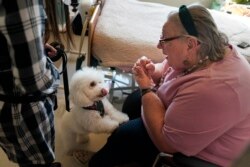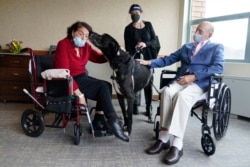Over the last nine months, Eileen Nagle has kept in touch with her family through video calls and drive-by visits. But the 79-year-old misses human contact and warm hugs since the coronavirus crisis led her nursing home to close to visitors.
Enter Zeus.
“Zeus is a friendly little snowball, very happy,” Nagle said after the small white dog visited her room at the Hebrew Home in The Bronx, New York City.
“Petting and playing with the dogs breaks up the day and gets you to forget about yourself for a while,” Nagle added.
The Hebrew Home has had a pet therapy program for 20 years. Little Zeus and a much bigger dog, Marley the Great Dane, are the current program members. The activities department is adding two new dogs to the program. The hope is to give residents more playful and loving contact with the animals.
“It’s uplifting to have Zeus come and visit me, especially with COVID and being restricted to my room,” said 80-year-old Jeff Philipson. He smiled as he ran his hand through Zeus’ soft white fur as the dog played on his bed. “I talk on the phone every day with my daughter and my son, but that’s as good as it can get for now.”
When the pandemic lockdown began in March, dog therapy was suspended. So were most other activities at the nursing home.
But Daniel Reingold decided to bring it back. He is chief of RiverSpring Health, the nonprofit operator of Hebrew Home. He also is founder of the pet therapy program.
“We needed to re-energize the pet visiting program since there’s no outside visitation allowed,” he said. “They’ve been on the floors bringing happiness and unconditional love to residents and staff alike.”
The dogs belong to staff members who bring them to work each day. The program does not permit just any dog to take part.
“It has to be a combination of the right owner, right dog and right temperament,” said Reingold. His own rescue dog, Kida, is one of the two new members of the pet therapy program.
Reingold explains that the dogs must be able to follow simple commands and behave well around machines and medical equipment.
Cats are also used in the pet therapy program — but only robotic ones. The Hebrew Home has several lifelike robotic cats that make noises as residents hold and pet them.
Catherine Farrell is director of therapeutic activities at the Hebrew Home. She is also owner of program dog Marley. “The love of an animal is incredible,” Farrell said. “For people here who had animals in their life history, seeing dogs triggers memories and opens communication.”
Farrell has to stay two meters away from residents and wear a face mask and plastic covering. But Marley can rest his head on residents' beds as they pet him. “To break through the social distancing barrier is really important,” Farrell said.
For Hebrew Home resident Elizabeth Pagan, dog visits are a welcome break from months of isolation. She has been restricted to FaceTime calls with her children, grandchildren and her own dog, Ruby.
“It means a lot to me, makes me feel good when I pet the dogs,” said Pagan. “My favorite is Marley. He gives me a lot of comfort.”
I’m Ashley Thompson.
The Associated Press reported this story. Ashley Thompson adapted it for VOA Learning English. Mario Ritter, Jr. was the editor.
__________________________________________________
Words in This Story
nursing home –n. a place where people who are old or who are unable to care for themselves live are looked after
therapy –n. a treatment for illness
resident –n. someone who lives in a particular place
allow –v. to permit, to let happen
staff –n. a group of people who are employed by an organization or business
temperament –n. the usual attitude or way of behavior of a person or animal
incredible –adj. very good
trigger –v. to cause to happen, to bring about suddenly
pet –v. to touch with your hand in a loving or friendly way
comfort –n. a feeling of ease and reduced worry, to not suffer pain or bad conditions







